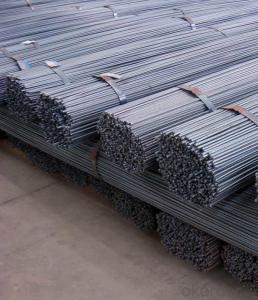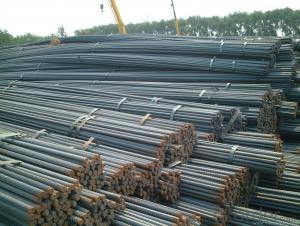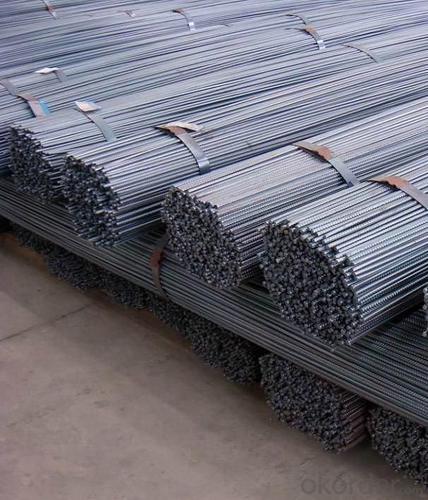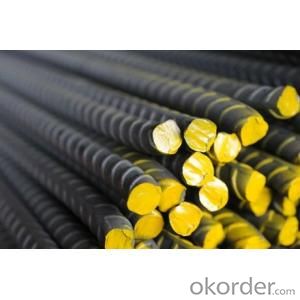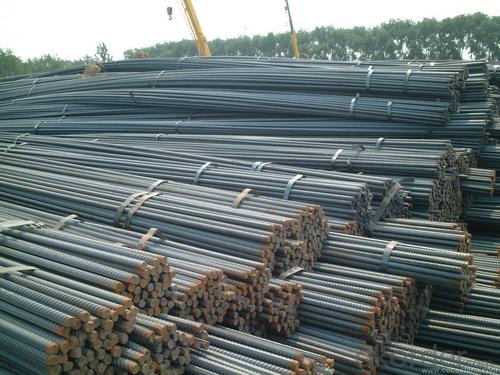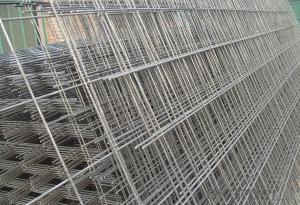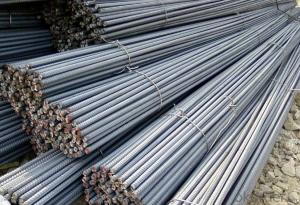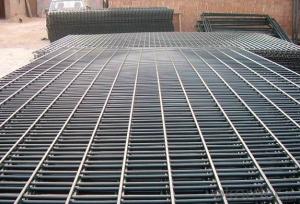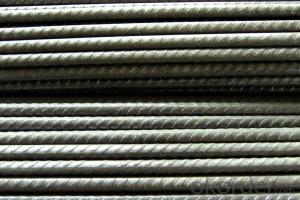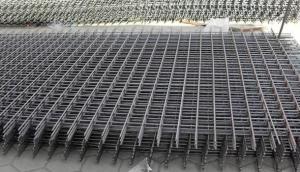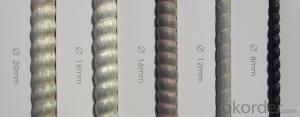Reinforcing Deformed Bar from 5.5mm to 32mm
- Loading Port:
- Tianjin
- Payment Terms:
- TT or LC
- Min Order Qty:
- 500 m.t.
- Supply Capability:
- 5000 m.t./month
OKorder Service Pledge
OKorder Financial Service
You Might Also Like
Reinforcing Deformed Bar from 5.5mm to 32mm
Structure of Reinforcing Deformed Bar :
Type | Deformed steel bar/ TMT bars | MOQ | 500 MT (Trial order accepted) |
Standard Grade | GB1499.2-2007, HRB335, HRB400, HRB500. BS4449/2005, B500A, B500B etc.. ASTM A615 Gr.40, Gr60, KS, SD400, SD500 and so on.. | ||
Technique | Hot rolled continuous casting | Length | 6, 9,12m, or as requested |
Size | 6mm-32mm | Payment terms | T/T, L/C at sight, Usance L/C |
Packing | In bundle | Inspection | Third party inspection accepted |
Trade terms | EXW, FOB, CFR, CIF | Trans terms | FIO, FILO, FLT |
Delivery time | 15-30 days, according to the quantity | Note | Customized service is available (for sizes,length and chemical components etc.). |
Main Features of Reinforcing Deformed Bar :
HRB335 | Chemical composition | C | Mn | Si | S | P |
0.17-0.25 | 1.0-1.6 | 0.4-0.8 | 0.045 Max. | 0.045 Max. | ||
Mechanical Property | Yield strength | Tensile strength | Elongation | |||
≥335 Mpa | ≥455 Mpa | 17% | ||||
HRB500 | Chemical composition | C | Mn | Si | S | P |
0.25 Max. | 1.6 Max. | 0.8 Max. | 0.045 Max. | 0.045 Max. | ||
Mechanical Property | Yield strength | Tensile strength | Elongation | |||
≥500 Mpa | ≥630 Mpa | 15% | ||||
Specifications and Datas of Reinforcing Deformed Bar :
Deformed steel bar | ||||
Diameter (mm) | Theoretical weight (kg/m) | Pieces/Mt (pcs) | Length (m) | Standard |
6 | 0.222 | 375 | 12 | GB1499-48, HRB335, HRB400, HRB500 BS4449-97, Gr.460B,B500
|
8 | 0.395 | 211 | ||
10 | 0.617 | 135 | ||
12 | 0.888 | 94 | ||
14 | 1.21 | 69 | ||
16 | 1.58 | 53 | ||
18 | 2 | 42 | ||
20 | 2.47 | 34 | ||
22 | 2.98 | 28 | ||
25 | 3.85 | 22 | ||
28 | 4.83 | 17 | ||
32 | 6.31 | 13 | ||
36 | 7.99 | 10 | ||
40 | 9.87 | 8 | ||
50 | 15.42 | 5 | ||
FAQ:
Why choose us:
1. More than 10 years experience in this industry
2. 100,000 tons exporting per month
3. Professional foreign trade team
4. OEM&ODM capacity
5. High quality assured & competitive price
6. Try our best to meet your needs & save your budget
7. Very popular in Southeast Asia, Africa, Mid-East and South America etc.
8. VIP membership system, first time customers and long-term cooperation customers can get extra discount on some products.
Pictures:
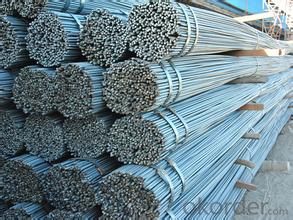
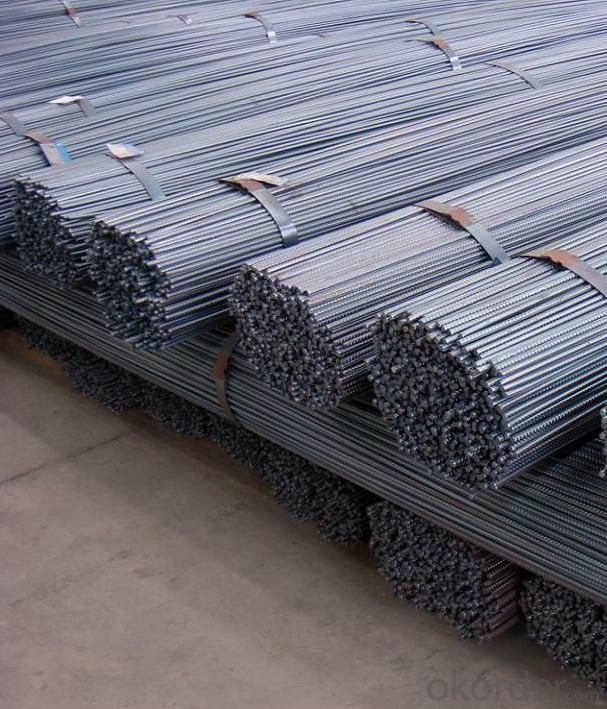
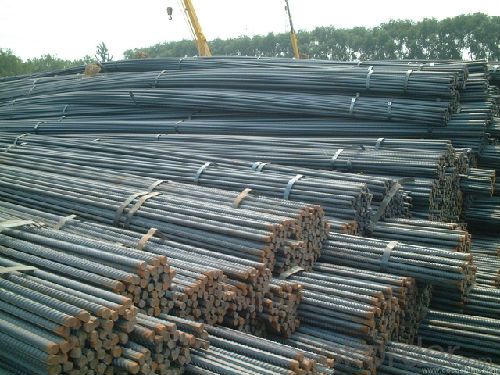
- Q: What is the expected joint deflection capability of ductile iron pipes?
- The expected joint deflection capability of ductile iron pipes can vary depending on several factors. However, in general, ductile iron pipes have a higher joint deflection capability compared to other types of pipes. The joint deflection capability refers to the ability of a pipe joint to accommodate angular deflection or misalignment during installation or due to ground movement. Ductile iron pipes are known for their flexibility, which allows them to withstand external forces and movements without compromising their structural integrity. The expected joint deflection capability of ductile iron pipes typically ranges from 1 to 5 degrees, depending on the pipe diameter and wall thickness. This means that the pipes can safely accommodate angular deflection within this range without causing leakage or failure. It is important to note that the joint deflection capability can also be influenced by factors such as the type and quality of the joint restraint system, soil conditions, installation techniques, and pipe alignment. Proper installation practices and adherence to manufacturer guidelines are crucial in ensuring optimal joint deflection capability. Overall, ductile iron pipes are designed and manufactured to have a significant joint deflection capability, making them suitable for a wide range of applications, including water distribution, sewer systems, and industrial piping networks.
- Q: What's the difference between cast iron pipe and steel pipe?
- Cast iron pipes (Cast, Iron, Pipe), cast cast pipe. Cast iron pipes are used for water supply, drainage and gas transmission lines. They include cast iron pipes and pipe fittings. Labor intensity is small. According to the casting method, it is divided into continuous cast iron pipe and centrifugal cast iron pipe, in which the centrifugal cast iron pipe is divided into sand mould and metal type two kinds. Divided into gray cast iron pipe and nodular cast iron pipe according to different material. According to the interface form, it is divided into flexible interface, flange interface, self anchored interface, rigid interface and so on. Among them, the flexible iron pipes rubber sealing ring; flange interface cast iron pipe flange fixed in the rubber pad, the flange gasket sealing; rigid interface cast iron pipe socket is large, straight pipe is inserted, sealed with cement, this technology has been basically eliminated
- Q: Can ductile iron pipes be used for slurry transportation?
- Yes, ductile iron pipes can be used for slurry transportation. Ductile iron pipes are known for their high strength and durability, making them suitable for various applications including slurry transportation. Slurry is a mixture of solid particles and a liquid, which can be abrasive and corrosive. Ductile iron pipes have excellent resistance to abrasion, corrosion, and erosion, making them capable of handling the challenges posed by slurry transportation. Additionally, ductile iron pipes offer a smooth inner surface, reducing friction and improving the flow of slurry. Therefore, ductile iron pipes are a reliable choice for slurry transportation systems in industries such as mining, wastewater treatment, and oil and gas.
- Q: What are the different methods for repairing ductile iron pipe?
- There are several methods available for repairing ductile iron pipes, depending on the extent and location of the damage. One common method is the use of repair clamps or couplings. These are designed to provide a temporary or permanent solution for leaks or cracks in the pipe. Repair clamps are typically made of stainless steel and are fitted around the damaged area, sealing it off and preventing further leakage. Another method is the use of epoxy lining or patching. This involves applying a specialized epoxy material to the inside of the pipe, which forms a protective barrier over the damaged area. This method is often used for smaller cracks or leaks and can provide a long-lasting solution. For more extensive damage, such as large cracks or fractures, the damaged section of the pipe may need to be cut out and replaced. This process typically involves excavating the area around the damaged pipe, removing the damaged section, and installing a new piece of ductile iron pipe. In some cases, trenchless repair methods may be used. This involves using advanced techniques such as pipe bursting or cured-in-place pipe lining to repair the pipe without the need for extensive excavation. These methods can be more cost-effective and less disruptive compared to traditional repair methods. It is important to note that the specific method chosen for repairing ductile iron pipes will depend on factors such as the extent of the damage, the location of the pipe, and the available resources and expertise. Consulting with a professional pipe repair service is recommended to determine the most suitable method for a specific repair situation.
- Q: Can ductile iron pipes be recycled?
- Yes, ductile iron pipes can be recycled. Ductile iron is a type of cast iron that has superior strength and durability, making it a popular choice for various applications, including water and sewage pipelines. When these pipes reach the end of their useful life, they can be recycled and used to manufacture new products. The recycling process involves melting down the ductile iron pipes to extract the iron, which can then be used as a raw material for producing new ductile iron products. Recycling ductile iron pipes not only helps conserve natural resources but also reduces the environmental impact associated with mining and manufacturing new materials.
- Q: Can ductile iron pipes be used for large-scale irrigation systems?
- Ductile iron pipes are ideal for large-scale irrigation systems due to their strength, durability, and corrosion resistance. They can withstand high pressure and meet the demands of extensive irrigation. Furthermore, these pipes have a long lifespan, minimizing the need for frequent maintenance and replacements. In addition, they are cost-effective when compared to alternative materials used in irrigation systems. Consequently, ductile iron pipes are a prudent choice for large-scale irrigation systems, given their strength, durability, corrosion resistance, and cost-effectiveness.
- Q: What are the different pressure ratings available for ductile iron pipe?
- Ductile iron pipe is commonly used in various applications due to its strength, durability, and resistance to corrosion. The pressure ratings for ductile iron pipe depend on various factors such as the diameter and wall thickness of the pipe. Generally, ductile iron pipe is available in pressure ratings ranging from 150 psi (pounds per square inch) to 350 psi. For smaller diameter pipes, typically ranging from 3 inches to 24 inches, the pressure ratings commonly found are 150 psi, 200 psi, and 250 psi. These pressure ratings are suitable for a wide range of applications such as water distribution systems, sewer lines, and industrial piping. For larger diameter pipes, typically ranging from 30 inches to 64 inches, the pressure ratings available are usually 150 psi, 200 psi, 250 psi, and 350 psi. These higher pressure ratings are often required for transporting larger volumes of water or other fluids over longer distances. It is important to note that the pressure ratings for ductile iron pipe are determined based on industry standards and guidelines. These standards ensure that the pipe can safely handle the internal pressure and external loads it may encounter during operation. When selecting the appropriate pressure rating for ductile iron pipe, it is crucial to consider factors such as the specific application, flow rates, and the expected operating conditions. Consulting with industry professionals and adhering to local codes and regulations is essential to ensure the proper selection and installation of ductile iron pipe for a specific project.
- Q: The difference between spheroidal graphite cast iron pipe and HDPE water supply pipe
- (4) HDPE pipes do not need corrosion protection. If the water supply pipeline is made of ductile iron pipe, the inner and outer walls of the ductile iron pipe shall be treated with corrosion protection.(5) the normal service life of the ductile iron pipe is 20~25 years after the pipe is treated by inner and outer walls. The HDPE tube has no corrosion, and the normal service life is 50 years.
- Q: What is the average cost of ductile iron pipe?
- The cost of ductile iron pipe can vary depending on various factors, including the pipe's diameter, length, thickness, supplier, and location. Generally, the price range for ductile iron pipe is around $40 to $200 per linear foot. However, it is crucial to understand that these figures are estimations and may change due to market conditions and other variables. To obtain precise pricing information that aligns with your project needs, it is advisable to reach out to local suppliers or distributors.
- Q: Are ductile iron pipes suitable for industrial applications?
- Yes, ductile iron pipes are suitable for industrial applications. Due to their excellent strength, durability, and resistance to corrosion, ductile iron pipes are commonly used in industrial settings such as water and wastewater treatment plants, power plants, and chemical processing plants. They can handle high-pressure systems, have a long service life, and are cost-effective, making them a reliable choice for various industrial applications.
Send your message to us
Reinforcing Deformed Bar from 5.5mm to 32mm
- Loading Port:
- Tianjin
- Payment Terms:
- TT or LC
- Min Order Qty:
- 500 m.t.
- Supply Capability:
- 5000 m.t./month
OKorder Service Pledge
OKorder Financial Service
Similar products
Hot products
Hot Searches
Related keywords
